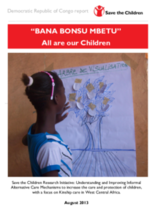Save the Children is undertaking innovative participative research in West and Central Africa on informal alternative care mechanisms,with a particular focus on kinship care. An estimated 15.8% of children under the age of 15 years in West and Central Africa do not live with their biological parents, the vast majority living in extended family care and only a negligible number lives in institutional care in that region. Evidence suggests that children are placed in kinship care for a variety of reasons, including traditional practices, poverty, increasing value for education and lack of access to secondary schools, and within broader trends in urbanisation, including migration, conflict, insecurity, and displacement.
The research was undertaken in four countries in West Central Africa: the Democratic Republic of Congo (DRC), Niger, Nigeria, and Sierra Leone. This report shares the process and findings from the research carried out in the province of Kasai Orientale in central DRC, in the cities of Mbuji Mayi and Mwene Ditu. Target groups included children living in informal kinship care arrangements, such as orphans and separated children, and children who had been left in the care of kinship caregivers in instances of parents migrating in search for work, or children who have been expelled from their homes due to accusations of witchcraft.
The objective of the present research study is to increase knowledge about kinship care in DRC and provide recommendations for programming to increase the care and protection of children. The study found that strengthening families should be the first priority. Supporting families who are struggling to provide care through socio-economic or livelihoods support, the provision of support through social work, or the removal of additional hidden costs, such as uniforms and school supplies, will greatly impact the ability of families to care for their children.

